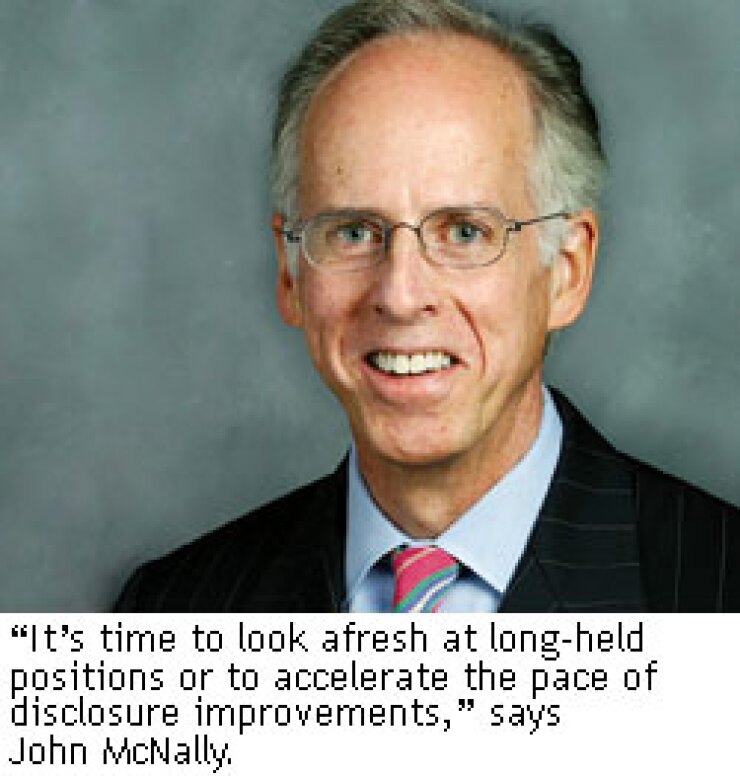
WASHINGTON — The National Association of Bond Lawyers’ new president as of Wednesday night, John McNally, appears to be the right man at the right place and the right time, according to the group’s members.
Between the heightened interest in disclosure among members of Congress, federal regulators and municipal market groups, the timing couldn’t be better for McNally, a partner at Hawkins, Delafield & Wood LLP here and a key author of NABL’s and the American Bar Association’s “Disclosure Roles of Counsel,” to take the helm of the bond attorney group, they said.
“NABL members will be very well-served by John’s presidency in the year head,” said Andrew Kintzinger, counsel at Hunton & Williams LLP here. “John distinguishes himself among a small handful of bond lawyers that specialize in municipal securities.”
“In light of the heightened interest at the [Securities and Exchange Commission] in the municipal market, and with disclosure being a topic at the front of their agenda, John is the perfect person to lead NABL in the next year,” said Kathleen McKinney, the group’s outgoing president and a shareholder at Haynsworth Sinkley Boyd PA in Greenville, S.C.
“I heartily agree that John’s leadership of NABL is well-timed,” said John “Jack” Gardner, of counsel at Hogan Lovells in Denver. “In the three years we slogged through the details and development of Disclosure Roles together, he proved his expert knowledge of the securities laws, his familiarity with municipal securities practices, and his innate ability to resolve many conflicting views expressed in seemingly absolute terms.”
In an interview Friday in his downtown office two blocks from the Treasury Department, McNally, 59, said he would like NABL to play a much greater role working with other market groups in trying to develop a consensus about appropriate disclosure models and standards.
In essence, he would like NABL — which considers itself an objective group whose clients include all municipal market participants — to play a coordinating role to create something akin to a Muni Council, a group of 18 market groups that met earlier in the decade to build consensus around improvements to secondary-market disclosure.
The Muni Council’s discussions led to the establishment of a voluntary, one-stop filing website for issuers’ disclosures known as the Central Post Office that was operated by the Municipal Advisory Council of Texas. McNally helped the Texas MAC obtain an interpretative letter from the SEC for the CPO. Last summer, the site was shut down after the Municipal Securities Rulemaking Board’s EMMA website made it unnecessary.
McNally said he is deeply concerned that market groups have remained in the same intractable positions on disclosure issues for more than three decades. He has been studying congressional testimony from muni hearings in the late 1970s and says the arguments for and against greater federal control of the market remain mostly unchanged.
He said he has heard the same positions espoused at recent meetings, conferences, and the SEC’s field hearing in San Francisco last month. When he has spoken publicly about disclosure on behalf of NABL, he has been lambasted by both issuers and analysts.
For instance, McNally said an analyst at a conference in New York last month warned that issuers routinely withhold important information from investors because they are urged by their bond counsel not to release it. In fact, McNally responded, concerns about selective disclosure regarding corporate securities do not apply in the municipal market and NABL has repeatedly encouraged its members to communicate openly with investors.
At a separate event in late January, McNally was criticized by a member of the Government Finance Officers Association’s debt committee for meeting with SEC officials as the commission works on the first update to its 1994 interpretive guidance on how issuers can avoid running afoul of the federal securities laws. Though the GFOA member claimed NABL seemed to be advocating for additional federal regulations, McNally shot back that, in fact, the SEC had asked how it could clarify ambiguous areas of the law and NABL had several ideas that might ease the burden for issuers.
“I want to make sure that NABL’s position is clearly understood so that people don’t continue to criticize us unfairly,” McNally said in the interview last week. “It’s time to look afresh at long-held positions or to accelerate the pace of disclosure improvements.”
All of the various municipal market groups should be able to come together and reach consensus on the timeliness and quality of disclosure, he stressed.
McNally acknowledged efforts announced earlier this year for the GFOA, the National Federation of Municipal Analysts, and NABL to jointly develop templates for interim disclosures, but said those efforts have yet to yield tangible results, signaling a possible opportunity for NABL to step up its leadership.
It will be more important than ever for industry groups to build consensus as the SEC moves forward with its series of field hearings, which are expected to lead to recommendations for industry “best practices” as well as regulatory and legislative changes.
In addition, two SEC commissioners, Elisse Walter and Luis Aguilar, have called for a repeal of the so-called Tower Amendment, which restricts the SEC and the MSRB from collecting documents prior to bond sales. Meanwhile, SEC chairman Mary Schapiro has bemoaned the lack of legislative authority to impose a disclosure regime on muni issuers that ensures investors receive timely, relevant and comparable information more on a par with investors in the corporate securities market.
Though McNally said he expects the SEC to push for Congress to impose a basic level of disclosure standards for the muni market, he is not convinced that could work. He said any across-the-board requirements established legislatively, even if minimal, would have to be so generic as to be meaningless. There is a wide variety of issuers and credits in the muni market, unlike in the corporate debt and equity markets, he noted.
“Legislation would be too cumbersome an approach,” he said.
As a result, McNally said he envisions a series of meetings between muni groups to establish market-based standards. While the SEC would be allowed to sit in on some of the meetings to monitor the progress, regulators would not be present at all the meetings to ensure free-flowing discussion.
McNally said the SEC would have to play some role in encouraging more frequent disclosure, perhaps by ensuring that issuers would not run afoul of the federal securities antifraud laws if they release more frequent information that is unaudited.
Currently, many issuers are reluctant to release such information if it is likely to reach investors because SEC guidance issued in 1994 warns they could be liable under the securities laws for anything that is inaccurate or misleading.
“It’s in the SEC’s interest to clarify that guidance to encourage us to get more information out,” he said. “We need some comfort.”
Asked about NABL projects, McNally said he has tapped Paul Maco, a partner at Vinson & Elkins LLP here, to head a task force to develop model pension-fund disclosure for official statements, working with a variety of market participants, including an auditor.
The task force reflects heightened enforcement of municipal pension disclosures, particularly the SEC’s August lawsuit against New Jersey for failing to disclose to bond investors that it was underfunding its two largest pension plans.
McNally is very familiar with these issues, having helped set up a robust disclosure system in San Diego after a pension disclosure debacle drove it out of the municipal bond market seven years ago and triggered an SEC enforcement action.
McNally’s bid to boost NABL’s leadership comes as the group is closing its Chicago office and moving its headquarters here. The move is a recognition that Chicago is more of a “legacy” office, the city where the group was founded and used to hold its fall Bond Attorneys Workshop, he said. But NABL ultimately decided there was no reason not to have all of its offices under one roof. The group is planning to stay in its current downtown offices, which it rents from Hawkins.
McNally cut his teeth on munis after graduating from Georgetown University Law Center in 1976, joining the municipal securities branch of the SEC’s division of market regulation, now trading and markets.
He has been in private practice since 1979, when he joined the boutique municipal securities firm Wood Dawson Smith & Hellman. In 1992, the partners of Wood Dawson joined Hawkins, another muni firm.





